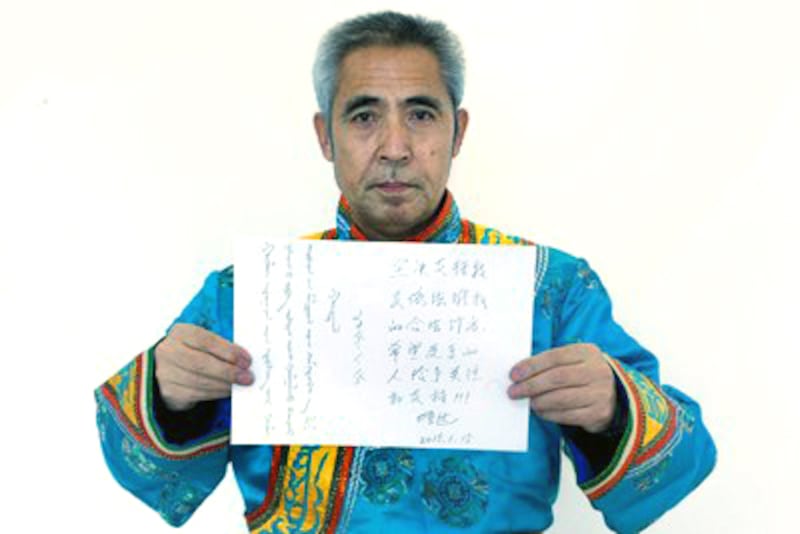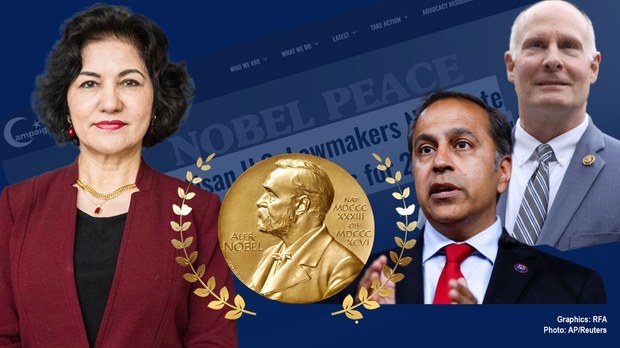2 US congressmen cited the nominees' ‘unwavering commitment’ to justice and human rights.
The rights group Campaign for Uyghurs and freedom of expression advocate Li Ying, known as “Teacher Li” on social media, were nominated for this year’s Nobel Peace Prize by two U.S. congressmen who are members of a China panel.
John Moolenaar, a Michigan Republican and chairman of the House Select Committee on the Strategic Competition Between the United States and the Chinese Communist Party, and fellow member Raja Krishnamoorthi, an Illinois Democrat, made the announcement on Feb. 5.
The praised the nominees in a statement for their “unwavering commitment to justice, human rights, and the protection of the Uyghur people against genocide and repression.”
About 12 million mostly Muslim Uyghurs live in northwestern China’s Xinjiang Uyghur Autonomous Region where they face repression by the Chinese government, which includes mass arbitrary detentions, forced labor, family separations, religious persecution and the erasure of Uyghur identity and culture.
“In the face of one of the most pressing human rights crises of our time, Campaign for Uyghurs and Teacher Li continue to shine a light in the face of adversity, while challenging injustices and amplifying the voices of those too often silenced,” Krishnamoorthi said.
Moolenaar noted the CFU’s “tireless advocacy and bold testimony” in ensuing that the world can’t ignore the truth about the Uyghur genocide in Xinjiang, and in amplifying victim’s voices to pierce the Chinese Communist Party’s wall of silence.

He also said Teacher Li had become “a vital lifeline for free expression, courageously breaking through China’s Great Firewall to shed light on citizens' protests despite grave personal risk.”
‘Long overdue attention to the Uyghur plight’
Established in 2017 by its executive director, Rushan Abbas, the CFU champions human rights and democratic freedoms for Uyghurs while urging the global community to take action against human rights abuses in East Turkistan, Uyghurs’ preferred name for Xinjiang.
Rushan said the nomination acknowledges her organization’s dedication to advocating for Uyghur rights and acts as a powerful symbol of the resilience of a people resisting oppression.
“We hope this recognition brings overdue attention to the Uyghur plight,” she said in a statement. “The Chinese government’s crimes are not just a regional issue; they constitute a global human rights crisis that demands immediate action.”
“The world must unite — governments, institutions, and civil society alike — to defend fundamental human rights for all, no matter the perpetrator,” Abbas said.
In February 2022, the CFU was nominated for a Nobel Peace Prize by U.S. Reps. Tom Suozzi, a New York Democrat, and Chris Smith, a New Jersey Republican, who co-chair the Uyghur Caucus.
In the past, other Uyghur advocacy groups and individual activists, including the World Uyghur Congress, Uyghur Human Rights Project, prominent Uyghur scholar Ilham Tohti, and former World Uyghur Congress president Rebiya Kadeer, were nominated for the Nobel Prize.
‘White Paper’ movement
Li Ying, a social media influencer who now lives in exile in Italy, rose to prominence during the ”White Paper" movement of November 2022, when thousands of people gathered in the streets of cities across China to protest lockdowns and mass quarantines President Xi Jinping’s zero-COVID policy.
The protests, in which people held up blank sheets of paper to show they felt authorities had robbed them of their voices, were also triggered by an apartment fire in Urumqi, Xinjiang’s capital, where dozens died, apparently because they were locked in their building.
Li took to social media to tell the world in videos and texts about the White Paper protests on his X account “Teacher Li is not your teacher”. While X is banned in China and news of the protests was heavily suppressed by the authorities, young people who supported the movement still found ways to send Li footage, photos and news of the protests.
Li, whose audience has grown to 1.8 million followers, continues to post news censored by the Chinese Communist Party in China, despite Beijing’s targeting of him, his family and online followers.
When Li woke up in Milan, Italy, on Feb. 6, his mobile phone was flooded with text messages congratulating him on the nomination, he told Radio Free Asia.
“I never thought that this would happen to me, because there are many human rights lawyers and activists who are currently locked up in China’s detention centers and prisons,” he said, adding that they were more deserving of the nomination.
“At the very least, this nomination demonstrates to the world, and to my family, that their son is not a traitor, and that he is really doing something to help the Chinese people,” said Li, who has been called a “traitor to the Chinese people” by Communist Party supporters.
“So, in that sense it is a recognition of what I do,” he said.
Mongolian rights
Ethnic Mongolian Hada, an ailing dissident and political prisoner from China’s Inner Mongolia Autonomous Region who goes by only one name, has also been nominated for the 2025 Nobel Peace Prize.

In January, four Japanese lawmakers nominated Hada for his continuing advocacy on behalf of ethnic Mongolians living under Chinese Communist Party rule, despite years of persecution.
Hada has been imprisoned or placed under house arrest in China since 1995 because of his activities. He is a co-founder of the Southern Mongolian Democratic Alliance, a campaign group that advocates for the self-determination of Inner Mongolia, a northern region of China.
The 2025 Nobel Peace Prize will be announced in October by the Norwegian Nobel Committee in Oslo, and awarded on Dec. 10, 2025.
Additional reporting by RFA Mandarin. Translated by Luisetta Mudie. Edited by Malcolm Foster.

